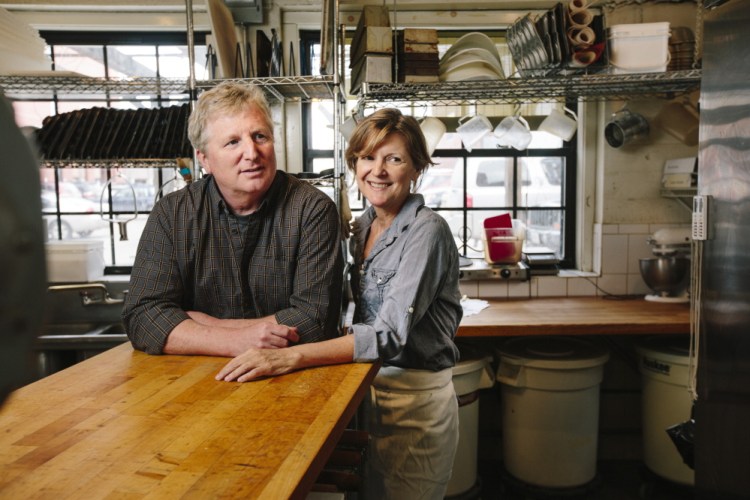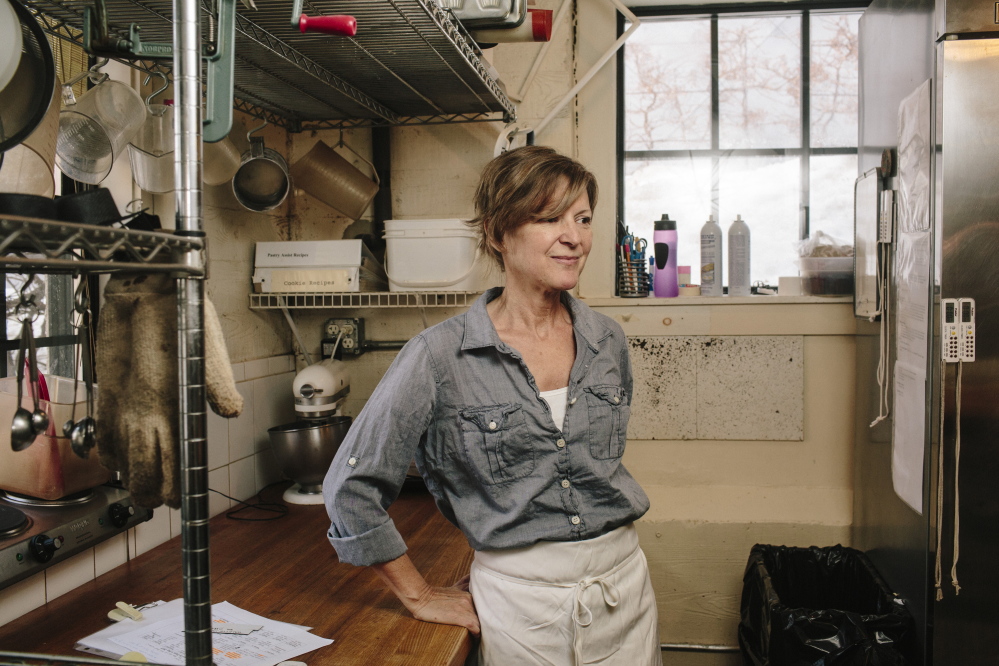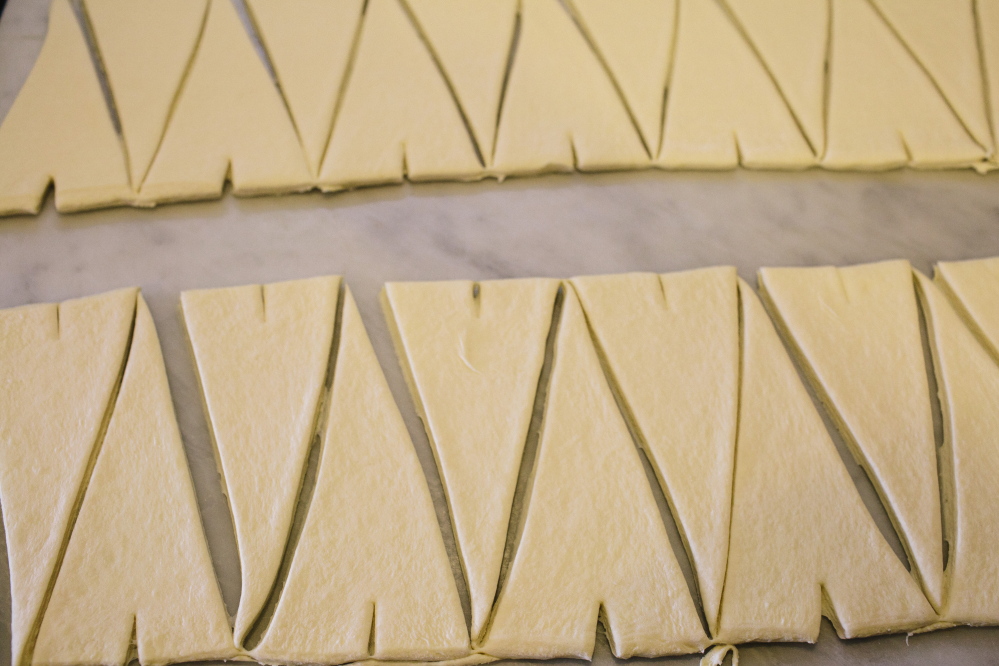EDITOR’S NOTE: This is the second of a three-part series in which we speak with a few of the record 10 Maine 2015 semifinalists for a prestigious James Beard Foundation Award. The New York-based foundation will announce the finalists on March 24 and the winners on May 4.
I love the baguettes at Portland’s Standard Baking Company. I love the financiers. I love the chocolate rye cookies (and I don’t even like chocolate that much). But these are not the reasons that the story of the bakery, which celebrates its 20th anniversary this year, is a love story. Some 25 years ago, co-owners Alison Pray and Matt James, who met while working at Rebecca’s restaurant in Boston, fell in love. A few years later, they traveled to France, where Pray fell profoundly in love with that country’s bread and the pastries. The bakery’s story also encompasses the couple’s passionate belief in the importance of neighborhoods, and it’s about a city that has steadfastly loved Standard Baking right back.
Pray and James flirted – OK, had a full-fledged affair – with a second bakery, Two Fat Cats. But after some five years, they sold it. “We didn’t have the ability to divide our attention,” Pray said. “It’s not natural to us to just grow and grow and grow for the sake of growing. It’s so much more important to focus on the details – to wake up every day and just try to make the best bread you can make.”
In February, Pray was named one of 25 semifinalists for a James Beard Award in the first-time category of Outstanding Baker. We spoke with her and James about that, about choosing a vacation spot where they could escape from pastry, and about the heartbreak of making a less-than-perfect loaf. This interview has been edited for length and clarity.
Q: I’ve been reading your lovely cookbook, Googling you, researching in our own archives and asking others about you, but I couldn’t find much. So how did you get started?
PRAY: I had worked in restaurants through college and in my 20s. It was in the ’80s. It was a really exciting time in food. Really good restaurants were starting to open – Chez Panisse and this new awareness of local food. But at the end of the ’80s I thought, ‘I’m going to get out of food and do something more in line with what I had gone to school for – economics.’ I was interested in community development. I thought I would travel and build villages. I took a class in architecture. For awhile I thought I wanted to join the Peace Corps. It was really important for me to find work that was meaningful. I was thinking ‘I’m getting out of food service because that was something you did temporarily, right?’ But after all that exploration, I realized there was a lot I really loved about food service. I did a total 360. At around that time, Matt and I started seeing each other. Matt had been waiting tables. He was an art student.
JAMES: I got a degree at Massachusetts College of Art in painting. I had good friends living in Portland, and I really wanted to give this city a try. I moved to Portland. And Alison moved up a year later.
PRAY: I was still taking classes and still trying to find ways to stay out of the food business. But I was waiting tables a couple nights a week at Street + Co. You could make really good money waiting tables, so we wanted to plan a European trip together. We took off for five or six weeks to Europe.
JAMES: Alison was totally smitten by the bakeries in France. She caught the bug right then and there.
PRAY: I was stunned that making food could be a profession, and not just a bunch of drunken line cooks. All the restaurants where I worked – really nice restaurants – but the lifestyle … that wasn’t the future I could see for myself. So the boulangers and patisseries were just astounding to me. The beauty and precision of patisserie, and the quality of the bread was like nothing I’d ever had in the U.S. Naturally leavened, whole-grain crusty loaves baked at that moment that you walked into a shop. I thought, ‘If you want to build an amazing community or neighborhood, you have to have one of these bakeries.’ It was a revelation. This is everything I want to do. Except that I didn’t know how to do it.
Q: Do you have a sweet tooth? Was that the appeal?
PRAY: I never really had a sweet tooth. I didn’t even like chocolate until my 20s. But they were just such beautiful works of art. It elevated the whole experience of eating. It’s not about gluttony and sitting down and inhaling a box of Ring Dings or Ding Dongs but these fine, beautiful, little, handmade, handcrafted pieces of art. Just one individual pastry was so satisfying. And they are not about super-sugary sweetness. The flavors are much more complex than that. The whole experience was unlike any food experience I had ever had.
Q: OK. So a revelation in France. But you didn’t know how to bake. Now what?
PRAY: Coming back from a long trip, I had this feeling, I think it’s common, this feeling of ‘I am going to make major changes in my life.’ I was adamant that I was going to make European-style breads. The breads really got to me. The patisserie was, well, icing on the cake. I really wanted to find a job in a bakery in the U.S. and learn how to make this bread. There were no culinary schools at the time that taught European-style bread. And there were just two bakeries in America doing this – Acme in San Francisco. And we knew of a really small bakery in Boston, owned by a husband and wife – Clear Flour Bread. They were the epitome of a neighborhood bake shop. I said to Matt, ‘How about if I apply for a job at Clear Flour and if I get it, we’ll move back to Boston? If it’s work that I love it as much as I think I’m going to, maybe we can come back to Maine and open a little bakery.’
JAMES: To pick up extra money, I got offered a job being the delivery person at Clear Flour. As the driver, I was responsible for tallying up the invoices. Even though I went to art school, I’m sort of a numbers person. So I was looking around at how many employees they had, how much they were paying for flour per pound, and I started thinking about the numbers. And then I got involved at the shaping table, too. The whole thing was very much a group effort. It was a really, really great atmosphere. That’s how I got drawn into the world of baking.
PRAY: The environment was really dynamic. It was very focused on making the best bread possible. You would be heartbroken if your bread did not turn out. The owners were wonderful people. They were the best role models for what the life of a baker could be: Here are two really normal, stable, interesting, creative people, and they’ve made a life for themselves and a place in their neighborhood. And now they are going into their 32nd year.
Q: Speaking of which, did you ever expect to be here for 20 years yourself?
PRAY: Never. We opened because we had dear friends with the resources to invest in us. We didn’t have the resources. Our first location was just 800 square feet. It was just Matt and I.
JAMES: We started baking bread for Street + Co.
PRAY: That was our only account. We didn’t have a sign out front. We didn’t have a cash register. We went in every day and made a batch of baguettes to sell to Street + Co. We had no business plan.
JAMES: We opened the door and had faith that if people walked by they’d be curious. And it really did happen that way.
PRAY: It was a bootstrap startup. We thought: What can we do with nothing? The very first day we made our baguettes and we walked them over to Street + Co. The next morning, Matt and I are back there at 4 in the morning and we’re mixing our dough. Our screen door was open – there was horrible venting in that place – that screen door was both our air conditioning and our heat. At 6 a.m. someone walked in, Jacques Chazaud. He was from France. He was married to an American and lived in Portland. He said in his thick accent, “I had dinner at Street + Co. last night, and they served me this bread. I have lived in U.S. for 20 years, I’ve never had bread like this. Never. They told me you make it here. So I must come. I must come.’ Imagine a thick French accent. I wish I could do it. It was a defining moment for me. ‘Oh, this is a bakery. We have a bakery.’
He wanted to buy a baguette. ‘Well, we’re not selling them, but I’d be happy to give you one.’ He insisted on giving us money. We had no place to even put the money. And he told us his story – about growing up and what bread meant to him.
But it’s not just French people. It reaches all demographics. The first time we got a fisherman – just a regular guy. That’s when I felt, this was our idea of what a neighborhood bakery should be. Good bread should be accessible to everyone.
Q: Why didn’t you study baking in France?
PRAY: Because I’m not bilingual. After three years of Clear Flour, I thought ‘OK, we know how to make bread and a small menu of pastries.’ But I felt woefully inexperienced to be starting a bakery. The training is continuous, from reading and doing, from hands-on experience and talking with other bakers and working with other bakers.
Q: I run into bakers and pastry chefs all the time with Standard Baking on their resume. Is mentoring important to you?
PRAY: Mentoring is huge. That is the beauty of baking and bread especially. You can’t learn it from a book. You have to learn by having your hands in the dough. And you have to learn from master bakers, or just bakers better than you. Watching what they do, trying to duplicate their movements, watching as they make adjustments to the dough. You learn from every batch that you make. It’s a constant work in progress to try to make good bread consistently.
Q: This seems like an amazingly interesting time to be baking. Suddenly, interesting grains are everywhere.
PRAY: The quality of our raw ingredients has improved in ways we couldn’t even have imagined 20 years ago. The idea of baking with local grains wasn’t even on the horizon. In Europe … well they are small countries. The farms – the grain farmers – are not very far away. The United States being so large and the industrial food system being what it is, to get a raw ingredient like wheat flour from any closer than Kansas, it wasn’t even a pipe dream. For me, right now, this is what excites me and inspires me more than anything else – sourcing better and better quality ingredients, more local and organic. To be able to have both of those is our dream come true. Chefs have been able to do this for years – to have local tomatoes and to work with the seasons. It’s now coming true for bakers.
Q: I understand you just returned from a vacation in Mexico. Will we see Mexican sweets at Standard any time soon?
PRAY: We’ve played around with pan dulce. I like them, but it’s not my favorite style. We try to make food that we love and hope that people will love it as well. We’ve spent years without taking any time off. I wanted a yoga retreat because I was exhausted. And I think we chose Mexico with the idea that there is not a bakery culture that we would be researching. We take research trips to Germany and France – all you do is run around to bakeries.
JAMES: Our hotel room is filled with bread, stacks of bread.
PRAY: Because we take one bite of everything.
Q: We haven’t yet talked about the James Beard Foundation Award. What would winning mean to you?
PRAY: We were shocked, obviously.
JAMES: We found out from correspondence from friends and customers.
PRAY: I got a text from a baker friend in L.A. about congratulations and Beard nominations. I didn’t know what she was talking about. I texted back, “Who got nominated? Who are we toasting?” She texted, “You did!” I’m amazed. Really amazed. First of all, the James Beard Foundation has never awarded bakers. The first thing I think is what an amazing crew we have that have allowed this to happen. And also the support that we’ve had in Portland from our very first customer. It acknowledges all the work and the relationship and the effort.
Q: Isn’t Clear Flour also a semifinalist? Is it strange to be competing against them?
PRAY: Oh, they should win. They should win. They have sustained their business for 32 years. They are what they are: A neighborhood bakery trying to do the best for their customers every day. There is so much integrity in that.
Q: Not to end on a downer, but I read this morning that the World Health Organization wants us to cut back drastically on sugar.
JAMES: Drink less Coca Cola!
PRAY: That is the chronic problem: Sodas, breakfast cereal, processed foods that have sugar in them where there is no need to have sugar in them. And the serving sizes! We eat organic. We really believe in nutrition and good health and local and in moderation. Soda is not a part of our lives. Candy bars are not a part of our lives. Breakfast cereals? Packaged breads? I don’t even consider them food. Do you mind if I have a little rant here? When I see these reports, I feel we are not even part of that. The quantity of sugar in our pastries is very low. It’s just a little treat, part of a well-balanced diet. Local whenever possible. Organic when possible. And good bread. Good bread does not need sugars and fillers and egg. It’s about the flavor of the grain and long fermentation and a tiny amount of salt. I honestly feel that what we make is health food. I don’t think artisanal neighborhood bakeries are the cause of chronic obesity in this country. It’s processed food. It’s cheap overly processed food in quantities that will kill you.
Send questions/comments to the editors.






Success. Please wait for the page to reload. If the page does not reload within 5 seconds, please refresh the page.
Enter your email and password to access comments.
Hi, to comment on stories you must . This profile is in addition to your subscription and website login.
Already have a commenting profile? .
Invalid username/password.
Please check your email to confirm and complete your registration.
Only subscribers are eligible to post comments. Please subscribe or login first for digital access. Here’s why.
Use the form below to reset your password. When you've submitted your account email, we will send an email with a reset code.